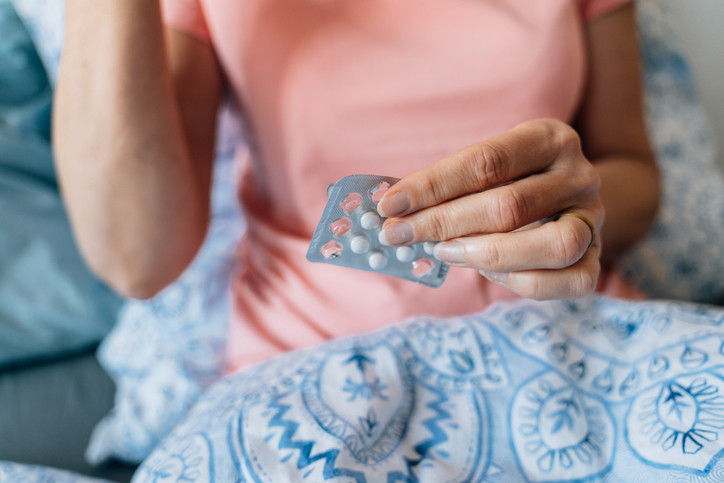
New thinking about plaque in arteries that feed the brain

Want to prevent shifting teeth? Maybe you need retainers

What you need to know about the new dietary guidelines

Food that’s healthier for people and planet can be cheaper, too

New evidence that polyphenol-rich foods help the heart

8 simple ways to reduce ultra-processed foods in your diet

How to curb your stress eating

How to spot Parkinson’s disease symptoms

Heart failure symptoms in women: How they’re different

GERD diet: Foods to avoid to reduce acid reflux
Medications Archive
Articles
Is sex hormone therapy safe for your heart?
The age-related drop in sex hormone levels can cause undesirable symptoms such as hot flashes or a flagging sex drive. Various formulations of estrogen or testosterone can ease those symptoms, but hormone therapy has a mixed record when it comes to cardiovascular safety. A 2023 study suggests that testosterone therapy is safe for men at high risk for heart disease. But women at high risk for heart disease But women at high risk for heart disease considering estrogen-based therapy need to balance menopausal symptom severity versus the greater chance of an adverse cardiovascular problem.
Low-dose aspirin linked to anemia
Older people who take low-dose aspirin every day may be more likely to develop anemia. Aspirin discourages blood clots, but the drug also blocks substances that help maintain and protect the delicate tissue lining the gastrointestinal tract. Long-term aspirin use can damage this protective layer, making bleeding more likely. Minor bleeding can go unrecognized and contribute to anemia, a condition marked by a reduced number of healthy red blood cells. People currently taking aspirin should check with their doctor to see if the practice still makes sense for them.
Weak kidneys? Pay attention but don't worry excessively
Kidney function declines with age in some people. A heart-healthy diet and lifestyle will protect your kidneys. Once kidney function reaches a certain low level, medication and other steps to protect the kidneys may be necessary.
Harvard Health Ad Watch: Why are toilets everywhere in this drug ad?
An ad for a medication featuring a person sitting on a toilet in multiple settings is eye-catching, but as with most drug ads, it doesn't provide some important information — such as common symptoms of the condition the drug is meant to treat.
FDA approves new over-the-counter gel for erectile dysfunction
The FDA has approved an over-the-counter topical gel to treat erectile dysfunction that men apply immediately before intercourse. It works in approximately 10 minutes.
Medication-taking made easier
About half the time, people alter how much, how often, or how long they take a prescribed medication, or they don't take it at all. This phenomenon, called medication nonadherence, can gravely threaten people's health, and is linked to about 125,000 deaths annually. People might not be able to comply with their drug regimen if they feel they take too many drugs, they don't like the side effects, the prescriptions cost too much, or they have memory problems or depression. Doctors should review medication lists and remove what patients no longer need.
Should I worry about the side effects of proton-pump inhibitors?
People with esophagitis (esophageal inflammation) can use proton-pump inhibitors to manage their acid reflux. This kind of medication can protect against scarring and narrowing of the lower esophagus.
Staying safe while getting well
Preventable adverse medical events occur in up to 7% of hospital admissions and sometimes can lead to serious and even life-threatening complications. Examples include inaccurate medications, unexpected infections, and problems during surgery. To help protect yourself from these events in the hospital, have a trusted partner be with you as much as possible, inquire about each of your medications when offered, and work with your nurse to move around safely.
FDA approves first drug designed to treat hot flashes
In May 2023, the FDA approved fezolinetant (Veozah), a nonhormonal drug specifically designed to reduce the frequency and severity of hot flashes in women. Potential side effects include liver damage, abdominal pain, diarrhea, insomnia, or back pain.

New thinking about plaque in arteries that feed the brain

Want to prevent shifting teeth? Maybe you need retainers

What you need to know about the new dietary guidelines

Food that’s healthier for people and planet can be cheaper, too

New evidence that polyphenol-rich foods help the heart

8 simple ways to reduce ultra-processed foods in your diet

How to curb your stress eating

How to spot Parkinson’s disease symptoms

Heart failure symptoms in women: How they’re different

GERD diet: Foods to avoid to reduce acid reflux
Free Healthbeat Signup
Get the latest in health news delivered to your inbox!
Sign Up











